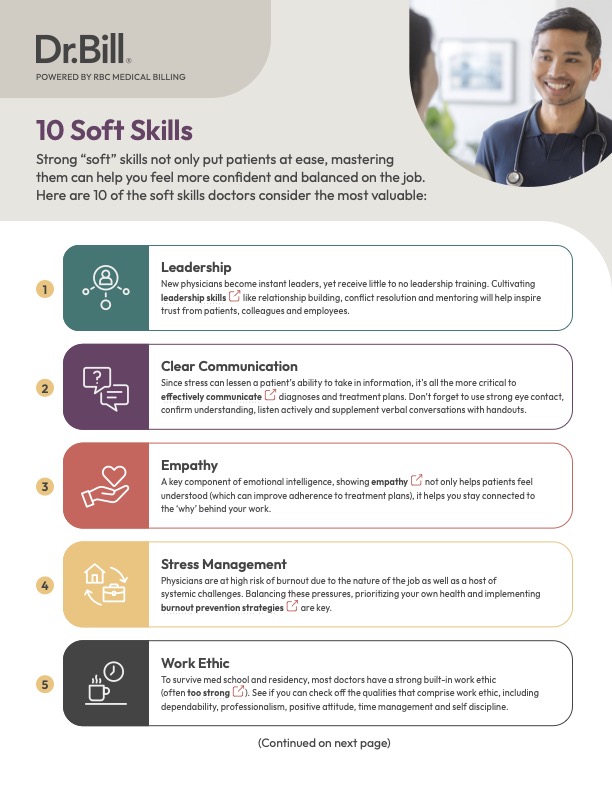Physicians all over the world have been called into action in the wake of COVID-19. Whether it was helping out in crowded emergency rooms, taking urgent care shifts, or adding telemedicine to your clinical offerings, there’s been plenty of change in the way doctors and other medical professionals practice. Even as we approach a ‘new normal’, plenty of doctors believe this change is here to stay.
To celebrate National Physicians’ Day on May 1, 2022, we want to highlight 5 Ways Doctors are Driving Change in the Post-Pandemic Medical Landscape:
- Increased Demand for Medical School
- Restructuring their Work/Life Balance
- Embracing Telehealth and Other Alternatives to Patient Care
- Adapting to New Technologies
- Taking Control of their Billings and Payments
Increased Demand for Medical School
Educators don’t know whether it was the extended time students had to prepare, the state of the economy, or the increased visibility of physicians on the news and in popular culture, but the number of applications for medical school has risen nearly 18% in the years since 2019. While it might seem surprising given high levels of physician burnout, many medical students are feeling up to the task.
Admissions leaders at medical schools suggest most new medical school applicants have been inspired to go from ‘someday’ to ‘now’ as shutdowns related to the pandemic accelerated their career plans and eliminated some of the fees and travel costs associated with applying. These aren’t necessarily students who have changed their career plans due to the pandemic, just ones who now believe medical school should happen sooner rather than later — which is great for Canadian patients!
Restructuring their Work/Life Balance
When the pandemic hit, long hours got longer. Wait times increased, and what were already difficult situations in emergency rooms became life or death decisions involving the ICU. For many physicians, the cost to their health and personal lives was simply too much.
Practicing emergency medicine and critical care means there’s a really high burnout rate for a lot of doctors,” says Dr. Daffer Ghanim, who works in the emergency room in Dawson Creek, BC. “Putting someone on life support really affects you as a person.
According to Dr. Ghanim, the stress has caused plenty of his colleagues to cut back their hours: many of them now work only 10-14 days per month, which he chalks up to a mentality shift among a new generation of physicians who are determined to make balance a priority.
[A lot of] physicians want a lifestyle balance now,” he says. “For some, the long hours just aren’t worth it.
Taking on locum roles, cutting back on office staff, and integrating technology into their practice are a few ways physicians are managing to see patients in less time — and according to Dr. Ghanim, these changes are here to stay.
Embracing Telehealth and Other Alternatives to Patient Care
“I think we won’t get rid of telehealth codes, ever,” says Dr. Alex Chesley, a family physician working out of BC. Like Dr. Ghanim, she’s noticed a high level of burnout among her peers, and believes the pandemic has been hard on the entire globe.
“Our generation is more concerned about having a work/life balance,” she says. While telehealth doesn’t work in every situation, many physicians are finding it easier to take virtual or phone appointments in addition to (or instead of) in-person visits, giving them more flexible hours to spend at home or accommodate family activities.
Adapting to New Technologies
Healthcare has consistently lagged behind other professions in the speed of technology adoption in the past — but the pandemic has proven that going digital can save both money and time.
A digital approach is indispensable in mitigating billing challenges in the long run,” says Dr. Aaron Lau, an anaesthesiologist working out of Ontario. “When you’re able to bill seamlessly on the go from your practice or your home, you can keep on top of your claims and spend less time on administrative tasks after you leave the office.
As a busy physician, Dr. Lau doesn’t have extra time to spend on complicated EMR systems or lengthy back-and-forths with provincial billing authorities, where CMA data suggests physicians fail to claim at least 5% of the services they provide. Using digital tools (like the Dr.Bill app), means he can spend less time on admin while still staying on top of his income — one way he and other doctors are taking control over their time.
Taking Control of their Billings and Payments
Dr. Chesley, Dr. Ghanim, and Dr. Lau all emphasized the same thing: taking charge of your time and your finances. For Dr. Chesley, this means adopting a mantra of ‘no one should care about your money more than you do.’ Dr. Chesley encourages new doctors to become familiar with specialty codes and be careful to follow up on what was billed to make sure you get paid what you should.
It’s kind of like going from high school to university,” she says. “No one is chasing you around to make sure your homework is done.
Dr. Ghanim also sees medical professionals becoming increasingly independent in their practices. “Doctors working 1-2 weeks a month no longer want to be attached to an EMR, a hospital system, or an assistant,” he says. “They want something they can do themselves.”
Using technology, setting their own hours, and creating more flexible ways to manage their time means physicians have found ways to take back hours in their day.
Utilizing the right digital tools speeds up administrative processes—and helps me eliminate duplicate work,” says Dr. Lau.
Whether it’s tackling the challenges of a busy emergency room or integrating new technology into your clinic, we’re grateful for the hard work doctors have done throughout the pandemic to help change medicine for the better. As we transition into a post-pandemic era, physicians are learning to balance the needs of their patients with their own need for flexibility and time, using new technologies, tools, and strategies to make the medical profession stronger than it’s ever been before.
To all physicians across the country, Happy National Physicians’ Day. Thank you for everything you do!

10 Soft Skills Every Physician Needs
Soft skills for doctors are an essential part of the job. Unlike almost every other career, at the core of the medical profession is someone’s well being.
Download the checklist to learn the 10 soft skills every physician needs.







